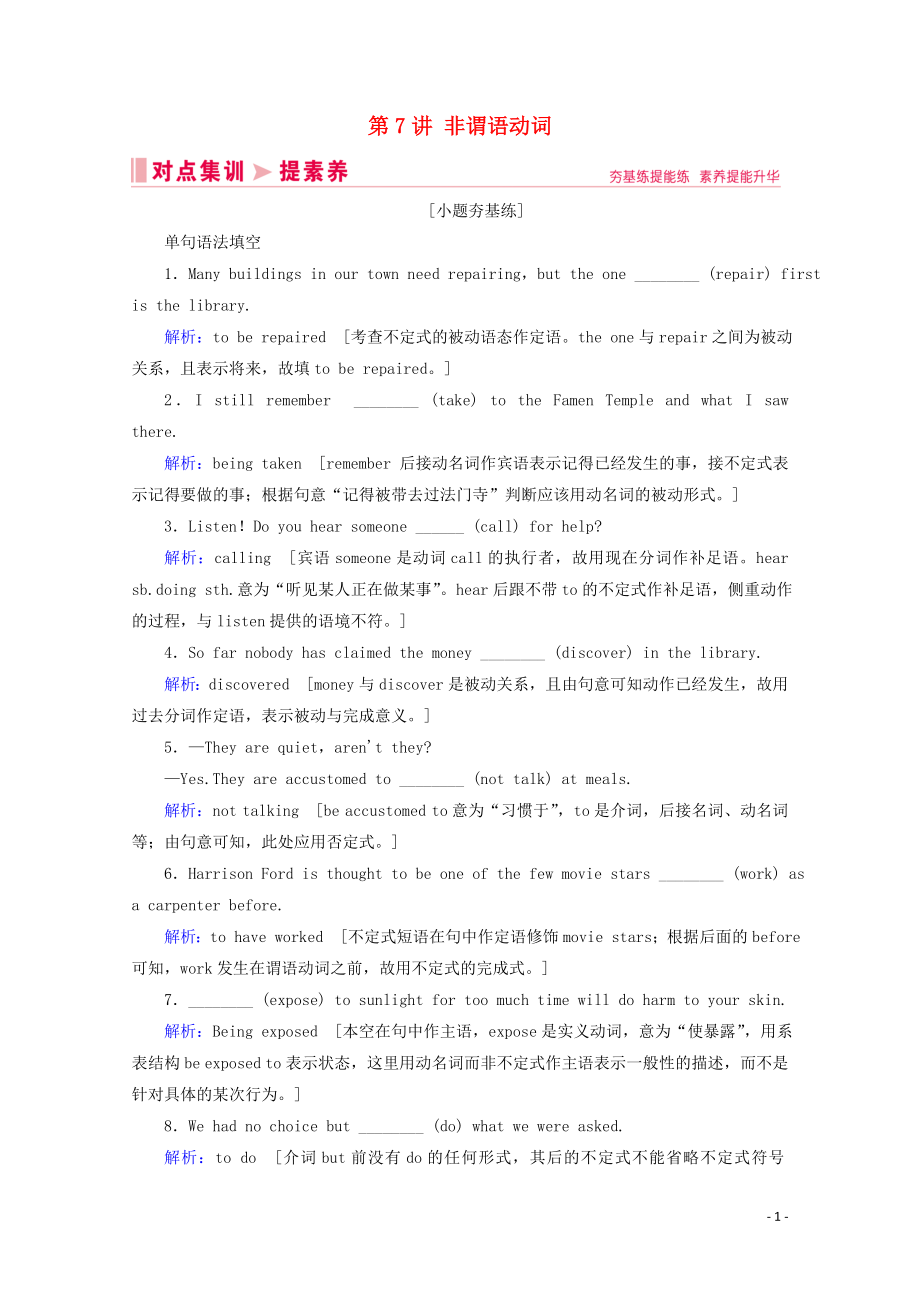《山東省2020屆新高考英語(yǔ)大二輪總復(fù)習(xí) 第一板塊 語(yǔ)法填空 專題二 語(yǔ)法填空通關(guān) 第7講 非謂語(yǔ)動(dòng)詞對(duì)點(diǎn)集訓(xùn)》由會(huì)員分享���,可在線閱讀�����,更多相關(guān)《山東省2020屆新高考英語(yǔ)大二輪總復(fù)習(xí) 第一板塊 語(yǔ)法填空 專題二 語(yǔ)法填空通關(guān) 第7講 非謂語(yǔ)動(dòng)詞對(duì)點(diǎn)集訓(xùn)(3頁(yè)珍藏版)》請(qǐng)?jiān)谘b配圖網(wǎng)上搜索�。
1、第7講 非謂語(yǔ)動(dòng)詞
[小題夯基練]
單句語(yǔ)法填空
1.Many buildings in our town need repairing�����,but the one ________ (repair) first is the library.
解析:to be repaired [考查不定式的被動(dòng)語(yǔ)態(tài)作定語(yǔ)���。the one與repair之間為被動(dòng)關(guān)系�,且表示將來(lái)���,故填to be repaired����。]
2.I still remember ________ (take) to the Famen Temple and what I saw there.
解析:being take
2����、n [remember 后接動(dòng)名詞作賓語(yǔ)表示記得已經(jīng)發(fā)生的事,接不定式表示記得要做的事�����;根據(jù)句意“記得被帶去過(guò)法門(mén)寺”判斷應(yīng)該用動(dòng)名詞的被動(dòng)形式���。]
3.Listen���!Do you hear someone ______ (call) for help?
解析:calling [賓語(yǔ)someone是動(dòng)詞call的執(zhí)行者�����,故用現(xiàn)在分詞作補(bǔ)足語(yǔ)�。hear sb.doing sth.意為“聽(tīng)見(jiàn)某人正在做某事”���。hear后跟不帶to的不定式作補(bǔ)足語(yǔ)�,側(cè)重動(dòng)作的過(guò)程���,與listen提供的語(yǔ)境不符����。]
4.So far nobody has claimed the money ________ (d
3�、iscover) in the library.
解析:discovered [money與discover是被動(dòng)關(guān)系����,且由句意可知?jiǎng)幼饕呀?jīng)發(fā)生,故用過(guò)去分詞作定語(yǔ)�����,表示被動(dòng)與完成意義。]
5.—They are quiet����,aren't they?
—Yes.They are accustomed to ________ (not talk) at meals.
解析:not talking [be accustomed to意為“習(xí)慣于”,to是介詞�����,后接名詞�����、動(dòng)名詞等�����;由句意可知���,此處應(yīng)用否定式����。]
6.Harrison Ford is thought to be one of
4、 the few movie stars ________ (work) as a carpenter before.
解析:to have worked [不定式短語(yǔ)在句中作定語(yǔ)修飾movie stars�;根據(jù)后面的before可知,work發(fā)生在謂語(yǔ)動(dòng)詞之前�����,故用不定式的完成式�����。]
7.________ (expose) to sunlight for too much time will do harm to your skin.
解析:Being exposed [本空在句中作主語(yǔ)����,expose是實(shí)義動(dòng)詞,意為“使暴露”�����,用系表結(jié)構(gòu)be exposed to表示狀態(tài)����,這里用動(dòng)名詞
5、而非不定式作主語(yǔ)表示一般性的描述�����,而不是針對(duì)具體的某次行為���。]
8.We had no choice but ________ (do) what we were asked.
解析:to do [介詞but前沒(méi)有do的任何形式����,其后的不定式不能省略不定式符號(hào)to����。]
9.Time ________ (permit),we'll go to visit the Great Wall on National Day.
解析:permitting [Time permitting是“名詞+現(xiàn)在分詞”式獨(dú)立主格結(jié)構(gòu)�����,在句中充當(dāng)條件狀語(yǔ)���。]
10.Eric went to his girlf
6���、riend's birthday party with a gift beautifully ________ (pack).
解析:packed [“with+名詞+過(guò)去分詞”為with復(fù)合結(jié)構(gòu),本題中a gift與動(dòng)詞pack構(gòu)成被動(dòng)關(guān)系���,故用過(guò)去分詞充當(dāng)賓補(bǔ)�����。]
[大題提能練]
語(yǔ)法填空——非謂語(yǔ)動(dòng)詞專練
Let children learn 1.________ (judge) their own work.A child 2.________ (learn) to talk does not learn by 3.________ (correct) all the time
7�����、�����;if 4.________ (correct) too much����,he will stop 5.________ (talk).He notices a thousand times a day the difference between his language and others' language.Bit by bit,he makes the right changes 6.________ (make) his language like other people's.In the same way�����,children learn to do all the other thin
8���、gs.They learn to talk�����,run����,climb,ride a bicycle by 7. ________ (compare) their own behaviors with those of more 8.________ (skill) people�����,and slowly make the 9.________ (need) changes.But in school teachers never give a child a chance 10.________ (find) out his mistakes for himself���,even fewer chances
9、 for him 11.________ (correct) himself.They do it all for him.Teachers act as if the student would fail 12.________ (notice) a mistake if they did not point it out to him.They act as if the student would never correct it unless he was made to.Soon he becomes dependent on the teacher.Let the student
10�、do it himself.Let him work out with the help of other children if he wants 13.________ (know) what this word means and what the answer is to that problem.
[語(yǔ)篇解讀] 本文講了老師應(yīng)該讓學(xué)生自己改正錯(cuò)誤而不是幫他們改正。
1.解析:to judge [固定搭配learn to do sth.]
2.解析:learning [動(dòng)詞-ing形式作后置定語(yǔ)�����,故填learning�����。]
3.解析:being corrected [by do
11����、ing表方式,此處表示“被改正錯(cuò)誤”����,故要用被動(dòng)形式�����。]
4.解析:corrected [correct與主句主語(yǔ)he為被動(dòng)關(guān)系�,故用過(guò)去分詞作狀語(yǔ)����。]
5.解析:talking [stop doing sth.停止正在做某事。]
6.解析:to make [不定式表目的�。]
7.解析:comparing [by doing 表方式。]
8.解析:skilled [過(guò)去分詞作定語(yǔ)�����,意為“熟練的”�。]
9.解析:needed [過(guò)去分詞作定語(yǔ),表示“必要的”���。]
10.解析:to find [固定搭配give sb.a chance to do sth.���。]
11.解析:to correct [固定搭配chances for sb.to do sth.。]
12.解析:to notice [fail to do 沒(méi)能做到����。]
13.解析:to know [want to do sth.想要做某事�����。]
- 3 -
 山東省2020屆新高考英語(yǔ)大二輪總復(fù)習(xí) 第一板塊 語(yǔ)法填空 專題二 語(yǔ)法填空通關(guān) 第7講 非謂語(yǔ)動(dòng)詞對(duì)點(diǎn)集訓(xùn)
山東省2020屆新高考英語(yǔ)大二輪總復(fù)習(xí) 第一板塊 語(yǔ)法填空 專題二 語(yǔ)法填空通關(guān) 第7講 非謂語(yǔ)動(dòng)詞對(duì)點(diǎn)集訓(xùn)

